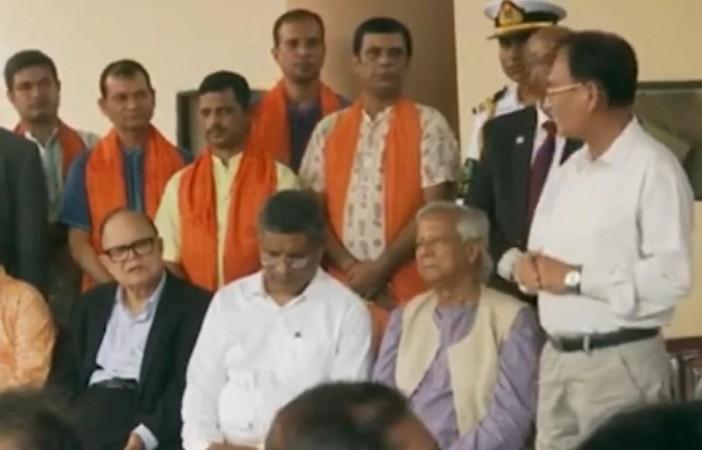
Fearing Bangladesh could well be the next Pakistan in the making in India's troubled neighbourhood, several scholars and experts on Wednesday severely condemned the recent statements given by Shafiqur Rahman, the radical leader who currently heads Bangladesh Jamaat-e-Islami (BJI), in which he has openly backed implementation of Sharia law in the country.
Rahman, the Ameer (Chief) of the largest Islamist party in the country which has been banned from contesting elections, was arrested in December 2022 before being released in March, this year.
Over the past few weeks, Bangladesh has witnessed massive unrest and violence against minorities - especially targeting the Hindu community in the country - following former Prime Minister Sheikh Hasina's resignation on August 5.
Even though Muhammad Yunus, sworn in as the chief advisor of the interim government, pledged to take control of the situation, massive atrocities were committed against the Bangladeshi Hindus.
Experts reckon that the BJI chief's latest comments will only embolden the radical elements in Bangladesh who are currently enjoying a free run.

"The way minorities have been harmed in Bangladesh is extremely condemnable. Now, Rahman is talking about implementing Sharia in the country which could lead to further suppression and harassment of people. Threatening people, and destroying their homes and temples is completely against Islamic teachings and customs. India helped Bangladesh in getting independence in 1971 and saving people from Pakistan. For this, every Bangladeshi should be indebted to India," said Mufti Shamoon Qasmi, an Islamic scholar who is also the Chairman of the Uttarakhand Madarsa Education Board.
Defence expert Qamar Agha reckoned that "anarchy will spread rapidly" if Sharia is imposed in Bangladesh.
"Investors, including foreigners, will back out as the situation will be quite similar to Pakistan and Afghanistan. Also, the kind of Sharia law which is backed by the Jamaat will not be acceptable to the Sufi society or institutions there. One must not forget that there is division in the Bangladesh Army too and the general public in the country believes in secular politics. Therefore, there is a lot of difference between Bangladesh and Pakistan. Bengali nationalism is deeply rooted in the people of Bangladesh. Besides this, Jamaat-e-Islami is not a very popular force there," said Agha.
He further said that if Sharia is indeed implemented in Bangladesh, then an attempt will be made to turn the eight per cent of Hindus of the country into second-class citizens, just like Pakistan has done.
"It will be a big problem for the region. It is also clear that the interim government has the support of America. In such a situation, all countries should unite and put pressure on the US. If Sharia is implemented in Bangladesh, it will have a direct impact on India because of the long border. Also, new extremist organisations will be formed there, creating instability in the region. India has made a big investment there and that too will be badly impacted," Agha added.
Shesh Paul Vaid, former Director General of Police (DGP) of Jammu and Kashmir, commented that the people of Bangladesh will have a big role to play in countering the growing radical forces in the country.
"It is for the people of Bangladesh to decide if they really want to live in conditions like Afghanistan. Do they want to live in a country governed by Sharia law because Bangladesh has been following the path of development. In such a situation, the 1.5 crore minorities there will also have to decide about their future. After the implementation of Sharia, they will not get any rights there and, in such a situation, they may be forced to ask for a piece of land for themselves and live separately. This decision will be taken by the people there," said Vaid.
Muslim scholar Mufti Wajahat Qasmi reminded that Bangladesh was founded on secular principles by Bangabandhu Sheikh Mujibur Rahman.
"Pakistan was divided in the name of Islam. It was said that Muslims wanted an Islamic system and Islamic discipline. Then those people who had gone to Pakistan tried to separate themselves from the system of Islam and create a secular country. Bangladesh was not divided on the basis of Islam. A large population in Bangladesh is of minorities. Bangladesh has been governed by secular law since its formation. In such a situation, the people of Bangladesh should come forward and answer on their own on such matters," said Qasmi.
(With inputs from IANS)

















